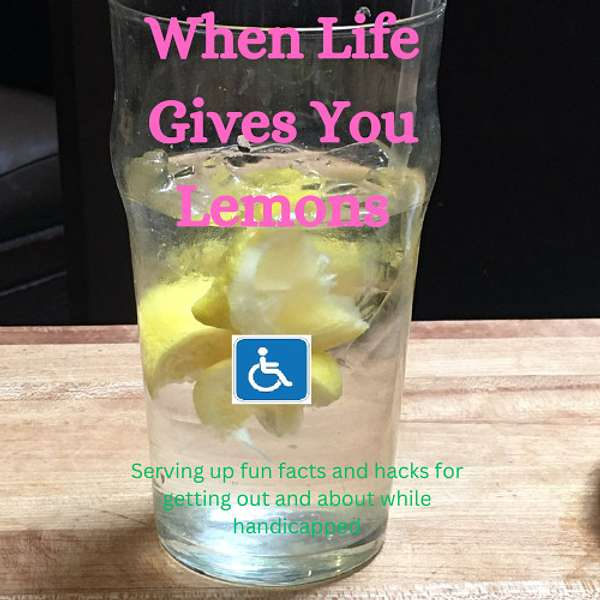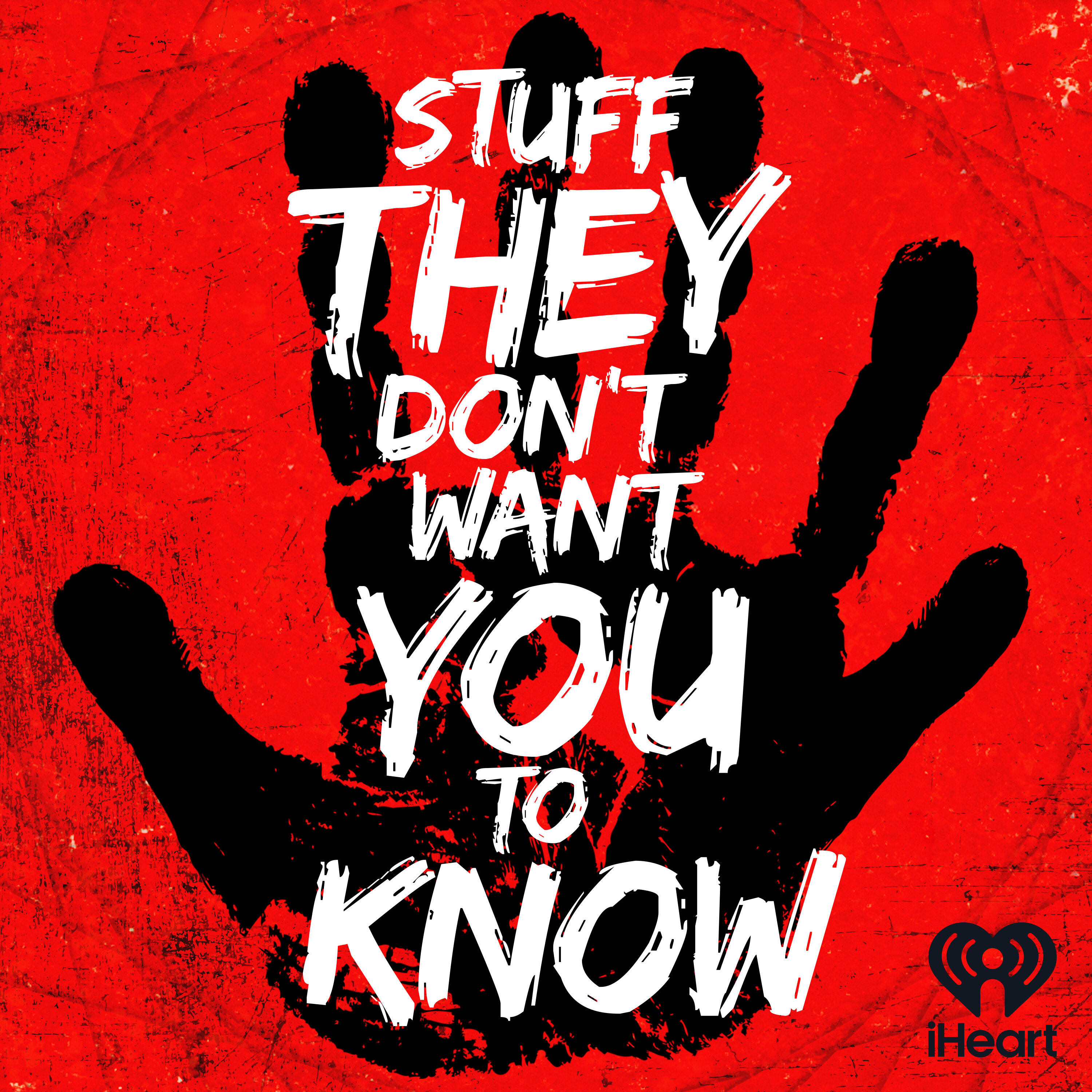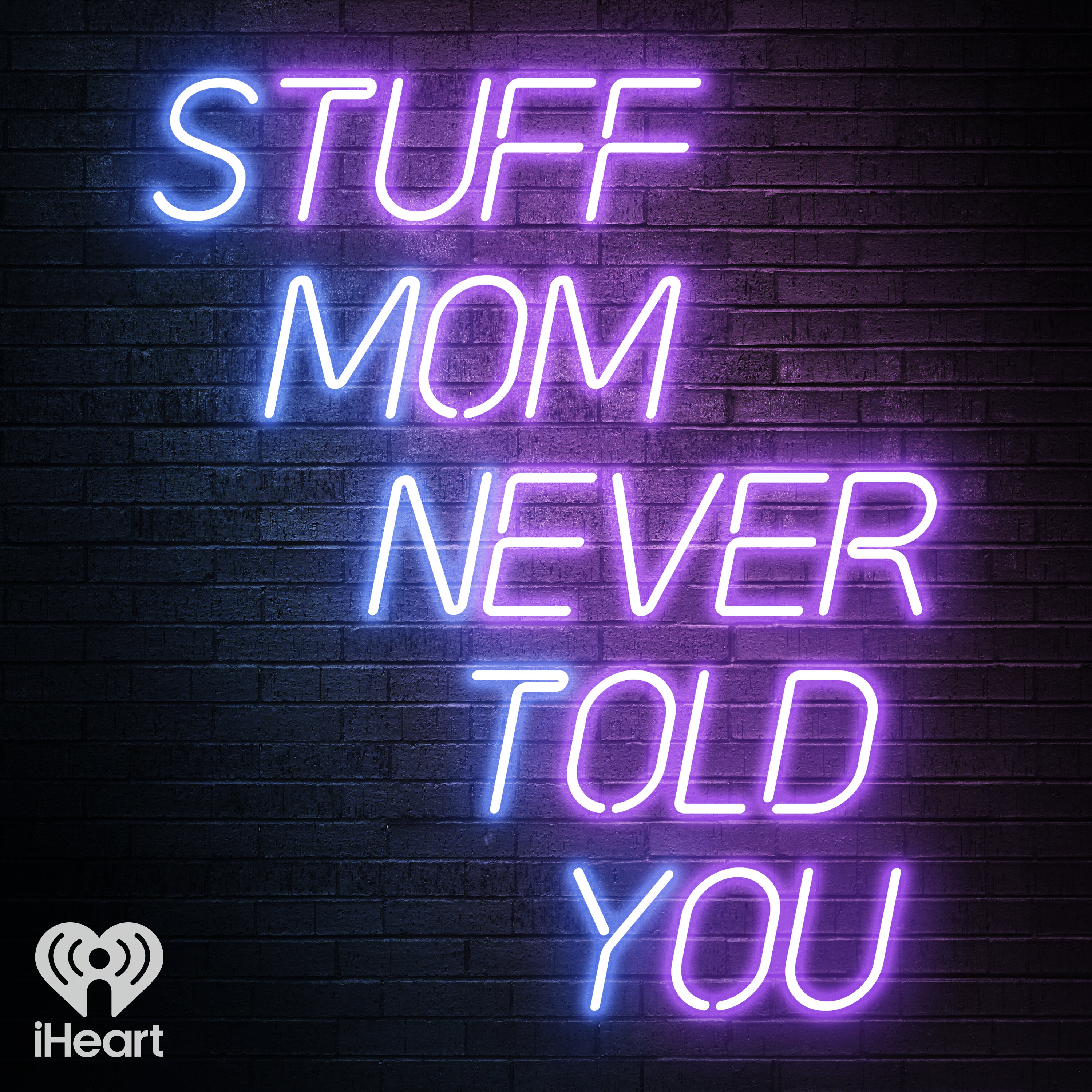
When Life Gives You Lemons
We do a bit of Research into handicapped travel issues and provide some solutions. Mobility, Hearing, Sight, Mental issues included. so far our episodes have included some information on Ataxia, Cerebral Palsy, Deafness, Dancing Sickness, Gulf War Syndrome, Long Covid and Wheelchairs. We are both Disability Advocates and realize there are too many diseases and conditions to cover and try to discuss the most common problems disabled people face and spread some awareness of disabled issues non-disabled people are unaware of.
CORRECTION
On a Previous episode I described how to enter our End Of Season contest. Step 1 click on the support our show link. Step 1 we require a one time payment (This has changed during our season) of $3. Step 3 (get you back to a one time payment) click on the $3 Subscription button. The following business day cancel the subscription (if you do it same day your bank may start thinking FRAUD. Step 4 Your done. Thanks for entering and "may the odds be forever in your favor",
When Life Gives You Lemons
Icons of Influence: Celebrating Disability in Entertainment
What if the media landscapes we consume daily held the power to redefine societal norms about disabilities? We're your hosts, Kevin and Pommy Henry, and we're here to explore how the Barbie movie sparked a renewed dialogue on the representation of disabled individuals in movies and TV. From the renewed interest in previously discontinued disabled Barbie characters to the historic portrayals of characters like Ironside and Star Trek's Captain Pike, we examine how the landscape is gradually evolving. We discuss the term ableism, its implications on employment and public spaces, and how the concept of "unemployable" affects people with disabilities. Our conversation also touches on how the COVID-19 pandemic has opened new telecommuting doors, potentially creating more opportunities for those with disabilities.
In another enlightening segment, we celebrate the resilience and achievements of influential figures in entertainment who are living with disabilities. Listen as we highlight the groundbreaking contributions of Marlee Matlin, RJ Mitte, Chris Burke, and Christopher Reeve, who have significantly reshaped how disability is represented on screen. NBC's role in increasing the visibility of disabled characters is part of our discussion, and we invite you to ponder the nuances of evolving language—should we favor "disabled" over "handicapped"? Lastly, we reflect on the cultural impact of Barbie dolls reintroduced through the lens of the recent movie, encouraging a broader narrative of inclusivity and understanding. Join us as we advocate for a media environment that embraces diversity and empowers all individuals.
Welcome to our podcast with Life Kishilums. I'm Kevin Henry and my partner in crime, and life is Pommy Henry. I have a rare disease known as spinal cell viral ataxia, which is a neuromuscular disease. This has left me with mobility challenges, with a speech impediment and noise-induced anxiety.
Speaker 2:Living with these disabilities for over 20 years, we have developed helpful hints and life lessons that we would like to share with you. That has made our life easier and possible. In some cases. We consider ourselves disability advocates and intend to educate ourselves and you about other disabilities and issues, and also talk about things we find interesting and frequently encounter when we're out and about. Welcome to when Life Gives you Lemons. I'm Palmy.
Speaker 1:And I'm Kevin.
Speaker 2:And this is our fourth episode. We've learned a lot so far, haven't we?
Speaker 1:We sure have.
Speaker 2:So keep sending in those likes and any suggestions of episodes in the near future. This episode is a little different than what we've been doing. Well, not really. It came about a little differently. We happened to be going to the Barbie movie, and if you've been to the Barbie movie you'll know that they brought back some of the disabled characters that they had in the past, that I didn't even know some of them existed.
Speaker 1:They were actually some of their least popular models that were discontinued. Yeah, Do you recall from your childhood? Barbie had lots of jobs. They went out of their way to try different cultural things.
Speaker 2:To include, be inclusive to all.
Speaker 1:And some just didn't sell well.
Speaker 2:Right, yeah, but that brought us to the subject of how often now we're seeing that they're including handicapped people in the movies, in the TV shows. It's a lot more. If I think back to when I was a kid, I'm not sure I ever saw anyone other than maybe that guy that was in the wheelchair. That was a lawyer. What was that guy?
Speaker 1:Ironside.
Speaker 2:Ironside. Yeah, so that was about the only person I can remember growing up that the handicapped society was included in that type of stuff.
Speaker 1:I remember one other one, but you have to be a Trekkie. Captain Pike was in a futuristic wheelchair.
Speaker 2:Well, more than that, because I think half of his body was missing.
Speaker 1:Right it's a weird thing. He was paralyzed and unresponsive, but he could think.
Speaker 2:They transferred his brain.
Speaker 1:I think is what I don't recall exactly, but I knew he had brain activity. I think it served as a platform to like speak what he was thinking.
Speaker 2:Yeah, yeah, now that you said that, I remember that my dad was a huge Trekkie fan and as a kid that was one of the things we sat down and watched together was Star Trek. So anyways, getting on to our episode, it's don't even know how to name, I guess, just how handicapped and disabled people have been represented throughout history.
Speaker 1:And currently where we're at basically Currently, I think, chat-gpt in a future, used exclusively for the research on this episode. They went with the 25% figure. I've been hearing that a lot lately, but I think that includes everybody that injured their arm or leg on the job, or what you call or term a temporary disability.
Speaker 2:And there's other disabilities that you wouldn't necessarily think is a disability, but the whole term is that you can't do your normal type of activity because of it.
Speaker 1:Again, we're not going to shy away from that discussion, but we do cover it in the next episode. Right, exactly, we're not going to really go in depth into that right now into that right now.
Speaker 2:So I do have a statistic about less than 5% of the disability roles on TV are played by disability actors, while in 2015, it was 2.7%. Of all the speaking characters in films was depicted with a disability. So that's basically what we're talking about now, and so we have to kind of acknowledge that most everybody has biases. You may not realize you have, but everybody does. And specifically for the handicapped.
Speaker 1:Discrimination for thecapped is very high and unrecognized. I think too, yeah, presently the word for it is ableism.
Speaker 2:Right, that was a new one for me. I'd never heard that before.
Speaker 1:I've read it a lot but I didn't know for sure that it was a thing. I don't do a whole lot of social media, but it's coming up in news articles every now and then it's coming up a lot on social media.
Speaker 2:So kind of like what we talked about before. Handicapped people face discrimination in being employed, having barriers to being hired, promoted or reasonable accommodations. Kevin, you can talk to that.
Speaker 1:Yeah, there is a term that is used in insurance it's unemployable. And what that means is, for example, with me, because of the disease I have, if I were to go into a place of work and hurt myself, the employer is going to have to pay a decrease in liability on his property. And if they offer health benefits through employment, I am going to affect the group rate that they've been offered through insurance companies. So basically they're going to have to pay an increased premium. Basically they're going to have to pay an increased premium and if it's a large company with a lot of employees, that might be a drop in the bucket. If it's a smaller employer with fewer employees, it might be a bigger percentage of the group, be a bigger percentage of the group.
Speaker 1:But the point is that the insurance company turns this as unemployable because basically employers don't want to give you a job. And pre-COVID there were a lot of on-site jobs and telecommuting was something that was done by people that had been with that company for a while. But since COVID I think a lot more people are allowed to telecommute, work off-site. If you will work offside, if you will, that sort of work I think would affect their insurance as much for people like me.
Speaker 2:And we just talked about public accommodation not being able to actually go to wherever it is that you're hired or just wherever you wanted to go.
Speaker 1:We ran into that several times we had a conversation a fair while ago about when the Twin Towers, the airplanes hit the Twin Towers and disabled people hit the, of course don't have the option of using the stairs, even though everybody tells you don't use the elevators in case of emergency.
Speaker 2:It's like well that's the only way.
Speaker 1:I can go up or down, and I think Pommy was saying yeah, people are carrying handicapped people down the stairs to evacuate.
Speaker 2:Yeah, a lot of firefighters were killed because of that specifically, they were trying to get people that were not able to, for some reason, get down the stairs, so I did hear that that was a major issue when that was all happening and then also state and local government services, where they may be denied equal access to the program's benefits and opportunities.
Speaker 1:For example, the Medicaid issue is very weighing on somebody who is permanently disabled mind because under Medicaid you have to make below a certain amount of money. I fall into the category of I make too much money so I don't qualify for Medicaid, but you have to be careful not to earn more than Medicaid allows. Medicare gives you, I think, a six-month window to try out employment, see that it's going to work out and see it's going to make your bills. And I think everybody, all the agencies that give you benefits, need to do this. Otherwise you're just going on a hope and a prayer and saying cancel my benefits and I'll make enough doing this job. For all you know, you won't have that job very long.
Speaker 2:Which has caused the additional discrimination because of poverty. A lot of handicapped people are in the poverty levels and again that itself leads into many, many, many problems Lack of education, lack of health care and violence and abuse. You're more vulnerable to physical and emotional and financial harm by predators who are trying to exploit someone's disability.
Speaker 1:And when PAMI brings up mental abuse, it's not always the bad guy accosting you on street. It's people constantly doubting whether you're faking it or whatever for your free benefits. I give up my benefits in a heartbeat to not be disabled.
Speaker 2:And I think a lot of people would do that, true disabled people would do that. I think that's a common trade-off.
Speaker 1:There are a lot of bad actors out there who want to take advantage of a short-term disability, like workers' compensation, or a long-term disability, like Social Security disability payments, and they bring out spotlights on everybody involved in the disability program.
Speaker 2:Right. These forms of discrimination violate the human rights of the handicapped person and prevent them from fully participating in society. And so, getting back to where we started on this, we noticed in the movies that there was more and more people that were being represented as either they were. In the past, I think they had been played by abled actors. And we noticed, because it was kind of brought to the surface with the Barbie thing, that nowadays we're seeing more and more people with disabilities playing people in shows, movies, that are physically disabled and still able to do the job that they were asked to do.
Speaker 1:Which is a good thing. It's also a bad thing if you're an actor, because you've heard of actors being typecast and unless there is a specific role that needs an actor with a disability which may or may not be tricolored, defined by his diagnosis, yeah, he's not going to have the choice of roles he had before. Take, for example, Michael J Fox with Parkinson's. You used to see him quite a bit. You don't see him as much now, but you do see him playing somebody with Parkinson's.
Speaker 2:And I think that's just because it's a progressive disease and at a certain point you're just not able to do the job. I think I just read. I watched his Netflix, or was it Apple, I can't remember. He has a special on there and I watched it and you know he's progressive, just like Kevin. Kevin's is progressive and 10 years agoday basis is a lot more actively portraying a disabled person's life.
Speaker 1:No, don't get me wrong, some actors do it quite well, but that is a job to do it quite well. In the past, the only disabled people I would see were actually actors who were fully capable, playing somebody who had a temporary disability Right a problem with, because that's how temporary disabilities work. But for somebody to be permanently mobility challenged, you really, kind of are doing your service by hiring a actor who is fully capable and not limited by disability to play that role, because disabled people have a tendency to uncover the flaw in the plan Okay, this is supposed to be disabled, but I have to go up steps which is not handicapped accessible. So you know, that sort of thing comes to light when you're hiring a true mobility challenge person to play that role.
Speaker 2:Well, they're actually representing the whole character and not just the part that's disabled either, because there's a lot of other things that people bring to a role than just being disabled.
Speaker 2:I watched a bunch of YouTube episodes, I guess, while I was preparing for this and there was a real question of you know whether they were questioning whether plots of this had that specifically had disability in it were accurately.
Speaker 2:You know, typically a movie will have, you know, represent a disabled person and they're on a journey to get somewhere or they're, you know, they're the hero of the story or the challenges that they are able to surpass because of disability. There was a real and I can't say for myself because I'm not disabled, but it didn't accurately portray a lot of the life of a handicapped person. You know, yes, there is challenges and you know you're looking for the bright light at the end and a lot of times there is no bright light at the end. You just learn to live with what disability you have and that is what is just life, like you know, it's next super, super character. Or, you know, you're not a Superman at the end. So there was a lot of controversy whether, even when we have stories like this, if they truly represent the disabled life.
Speaker 1:A good example of that is, I believe, dr Strange. When he had a car accident. He was no longer able to use his hands properly and he was a neurosurgeon, so he just kind of went off the deep end and said I can't make a living doing what I'm used to doing. Instead of coping with it and doing something else, he went on a pilgrimage, basically learned a lot of mystical things that allowed him to use his hands normally.
Speaker 2:Right, that was one of the criticisms is that magic was. You were thought to believe that these handicapped people were able to achieve that, these things even in real life. Not just you know superhero, but because it was magical or it has superpowers or you know. They always say that blind people have their other senses, become enlightened and stuff like that, and that's really not the case. It's the fact that they learned to live with their disability and other things come to light.
Speaker 1:Yeah, there are a lot of disabilities out there that are quote-unquote uncarable right now, as of you know, 2023. Right now, as of you know, 2023. So the hardest part as a disabled person is facing up to the fact that you're not going to get better and you have to make do with what you got.
Speaker 2:And make your life kind of when you have life. When life gives you lemons, you just make what you can of it and you enjoy your life. Everybody gets one life and if you're miserable throughout the entire part of it, it probably wasn't a very happy life.
Speaker 1:To continue on with that metaphor in my case, life gave me lemons on of made a really sloppy lemonade.
Speaker 2:But it's a joy to drink.
Speaker 1:According to Bob it is.
Speaker 2:Oh, I'm sure your daughter thinks so too, but you're not fighting it like you were, you know, in the very beginning. It takes some time to adjust to it.
Speaker 1:It takes time to wrap your adjust to it and teach time to wrap your head around it.
Speaker 2:And depression is always part of it, I think.
Speaker 1:It is.
Speaker 2:But anyways, getting back to it, so there was a lot of stars with disabilities that have after we took note of that. They came to mind. Like Marlene Matlin, she's deaf and she starred in many movies as the children of the lesser god, west Wing and the Switched, and she's currently, I think, playing Switched. At birth, kevin really was big into Breaking Bad and the actor that played the son has cerebral palsy and he RJ Mitty, is that how you say it?
Speaker 1:Yeah, that's him. Yeah, yeah, Played Walter Wright's son with cerebral palsy, and he actually had cerebral palsy.
Speaker 2:And then there was Chris Berkey is an actor who has Down syndrome. He plays Corky in the TV show Life Goes On and he also has appeared on ER and Touched by Angels and the Commish. Of course, probably the most famous is Christopher Reeve, who became a quadriplegic after a horse riding accident and he had previously played Superman in four of the movies. And he had previously played Superman in four of the movies and was I don't know that he ever. I think he starred in a show about himself, a special or something like that.
Speaker 2:A documentary, a documentary about his life. Afterwards, unfortunately, he succumbed to his injuries. And then there's other factors, and then thinking of a different disorder, and he's the host of the Deal or no Deal and a judge of Americans Got Talent. Now you don't necessarily think of that as a disability. It's an unseen disability, I guess, and those are probably the most popular or not popular, but largest amount that would represent the disabled people.
Speaker 1:I think we go on to break down in a future episode which network has more disabled actors than others and how that number has been rising for several years.
Speaker 2:Yeah, and it says NBC leads the broadcasting network in terms of representing people with disabilities, with 18 characters representing 12% of the network's series regulars. And there are some of these TV shows that cast disabled actors are actual disabled characters, such as CODA, coda, call the Midwife, feel the Beat and Game of Thrones. 3. Game of Thrones 3?
Speaker 1:I think we should also note that, as I said before, we use chatGPD to augment our search in this episode, and chatGPD doesn't interact with you if you use hate speech, and it informed me that being labeled as handicapped was considered hate speech.
Speaker 2:Never heard that before.
Speaker 1:I hadn't either. So disabled is what Never heard, that before I hadn't either. So disabled is what ChatGPT recommended. We've been going out of our way to use the word disabled in this podcast in case that is the case. But if there is a issue about if handicapped is a derogatory word or a hateful word, certainly email us and let us know that, because we just didn't think anything about it. We park in handicapped spaces, we apply for handicapped permits, hotels ask for handicapped rooms. It just never occurred to me. That word is offensive. So if you feel that is the case, give me some feedback.
Speaker 2:We'd like to see what percentage actually have heard this yeah it was totally new to me. We're not big media people, so we're not aware of that. So if we offended anybody, we would like to apologize at this point. I think that does it for us today.
Speaker 1:Well, let's talk a little bit about the Barbie bottles. That were not big sellers, but they had mentioned the movie. During the movie I didn't really think that much of it. I thought they just had some story made up with Barbie to take that role. But, as it turns out, during the credits they actually would show the products and why they were and some of them were actually pretty common sense but why they were less popular than other dolls. They were less balled than other dolls, but handicapped Barbie was a thing it just didn't sell as well as other Barbies did, so they took it off the market.
Speaker 2:But there was also a pregnant Barbie which you know. That would be common sense, I think.
Speaker 1:That was common sense. Because they kept Barbie. They showed the credits. Came with, like I don't know, five kids. You would give Val Crowe a dress.
Speaker 2:No, that was another character. That was the babysitting Barbie, I think.
Speaker 1:But they had a theme in the movie that Barbies that got played with too much got broken either in their mind or their body.
Speaker 2:Yeah, that was a strange situation, but that was not a discontinued bottle. They didn't have that for real. I did see that they are now. It is now a Barbie that you can get.
Speaker 1:I can see that they are now. It is now a Barbie that you can get. Yeah, it is now, because you know I mentioned it does quite well in sales.
Speaker 2:Yeah, anything unusual these days does well.
Speaker 1:Yeah, they might actually bring back some of the lesser models, because they were mentioned in the movie, because of the popularity, yeah. The movie was actually the most popular thus far this year.
Speaker 2:Yeah, it was a top-selling movie.
Speaker 1:I went twice, I got some of my money. It broke all the box office records, that's for sure.
Speaker 2:Yeah, I think it was not a good year for movies, though, because of the striking of the writers and the striking of the actors' guilt, so I think some of that might have had.
Speaker 1:A lot of movies and TV shows are like halfway done and they're waiting for the strike to end or resolve itself.
Speaker 2:But now they're in league with the Actors Guild that is now on strike. Basically, they're waiting for that Hollywood strike to be resolved so they can finish unfinished parts of movies or TV shows that typically and you'll be able to tell me more I see this through your life that you increased the amount of television that you watch, movies that you watch because of your handicap, because of dear disability, and I find it ironic that they're just getting it that you know they should represent that part of the population, the population. Yeah, I think that's ironic that they're just now getting it. If you're talking 25, even if that's a low number of the disability people that are disabled, disabled in america or in the world, that was america, right yes yeah, if you just consider they're missing a large section of possible eyes on their movies or TV shows or whatever.
Speaker 1:Oh, I'm sure there are people that are way more into this sort of thing and will actively seek out programs that have disabled people or shy away from programs where a fully capable actor is playing a disabled role, but that's based on the time we live in. I hear a lot more of that now.
Speaker 2:It seems like in the last century, maybe we have a lot more opinions.
Speaker 1:Well, the famous quote was you know, before we had the internet?
Speaker 1:people would say yeah a certain population of our you know percentage of our population is going to be ignorant of some kind of issues because they just don't or not that well educated. Then along came the Internet with all the information available. Everybody wants to educate you and the meme now is like no, that wasn't it. It's kind of a joke because once you unleash everybody to start doing their own research, a trend I'm seeing is people that label science as pseudoscience and vice versa. They're doing their own research and listening to people who do promote pseudoscience because it goes along with part of the research. They're going with those, or what?
Speaker 2:they want the consequence to be.
Speaker 1:Exactly and I hope we don't fall into those categories in this. But, as I said, I'm going to try to use demonstrate some biases based on the information that was put into the programming of that.
Speaker 2:Well, it can only spit out what you gave it.
Speaker 1:Exactly. The term that we're used to using in computer science is garbage in, garbage out. If the process going into a program is flawed, the conclusions of the program are going to be flawed, or could be flawed if they get into the flawed areas of the program.
Speaker 2:Sounds good, all right, let's end the program here.
Speaker 1:Okay, one thing we should mention is how to get a hold of us. You can go to our website at wwwwhenlifegivesyouleveragenet, and all the information on how you can get a hold of us is there. We're going to start having a social media presence in the future, then that about does it. We'll see you next episode.
Speaker 2:Bye now. We are always looking to improve the podcast, so if you want to hear a specific topic, have a differencing opinion, want to add something to the conversation, drop us an email. Our contact information is listed on our website. It's wwwwhenlifegivesyoulemonsnet. We have recently added a companion YouTube channel called Making the Lemonade. If you enjoy the podcast, continue your enjoyment by joining us on YouTube.












